Introduction
I have been fortunate enough to get selected to be a speaker at WordCamp Lyon on October 28th. It was my first WordCamp, here’s a recap of this day.
Being selected as a speaker
It all started with a tweet from the organizers @wplyon stating the call for speakers would close in two days, with the application link.
I clicked it out of curiosity, and faced the application form. I don’t know why, but I felt inspired at the time. I thought I could present a talk about Full Site Editing, more specifically, the learning curve a classic developer would face when trying to learn FSE, as it’s a subject I’m well into at the moment with my FSE streams. Because the form was not too heavy to fill, I submitted it, then forgot about it.
A few weeks later, I got an email from the organizers. My talk was selected! What a piece of news! Time to prepare the talk and myself in order to get ready for this memorable day.
Preparing the slides
I wanted it to be a talk about what it takes to learn WordPress Full Site Editing when you’re, like me, coming from the more classic WordPress ecosystem.
Here’s the plan I had in mind :
- A little Gutenberg project recap
- The learning path roadmap
- How to declare a block theme
- How to declare templates and template parts
- theme.json
- Block patterns
- Reusable blocks
- Custom blocks
I prepared the slides accordingly, using google slides. It took a few iterations to get it right.
Once I got a solid first draft, I rehearsed out loud to get a sense of timing. I was far too short, but I felt that was good news. I find it easier to elaborate than to cut content. I added more explanations on some slides, a few examples, and a few extra parts to get the timing right.
As it was my first time, I got the slides reviewed by the mentoring team, who gave me a thumbs up. It gave me a confidence boost, it’s nice to get the impostor syndrome out of the way.
With my slides ready and approved, I spent some time rehearsing again and again, until I got the feeling I was mastering the talk, by heart, with tone and fluidity.
Conference eve
As a speaker, I got invited to the pre-conference dinner with all the other speakers, the organizers, and the sponsors.
I didn’t know many people there, but it was nice to meet plenty of passionate WordPress peers. It’s also great to meet for real the people you follow on Twitter. There’s been a great atmosphere, a sense of community. I got plenty of advice from experienced speakers that was very appreciated.
I’m grateful for all the interesting conversations we’ve had, and the new friends I’ve made. It was an overall very good night.
Conference day
I was a big fan of the WordCamp program when I saw it on the official website. It was made of two tracks of 9 talks each. One track was more technical, and the other had plenty of various subjects. I spent most of my time on the technical track.
The event was held at the “Embarcadère“, a nice place located on the river Saône banks, I got there easily using public transport.
Here’s a recap of the talks I’ve attended.
Je suis un-e dev WordPress, by @oelita
Sylvie Clément opened the day with a first talk questioning what makes us WordPress developers. Is it the fact that we code? Is it the fact that we build? Is it the fact that we provide a service?
I like the focus on the fact that at the end of the day, we provide a service. Be it with code or another piece of knowledge, our clients do not really care, and our client’s customers couldn’t care less. What’s interesting in the WordPress ecosystem, is that it enables plenty of different people to provide services to those who need them.
Introduction au développement de blocs pour l’éditeur, by @VinceDubroeucq
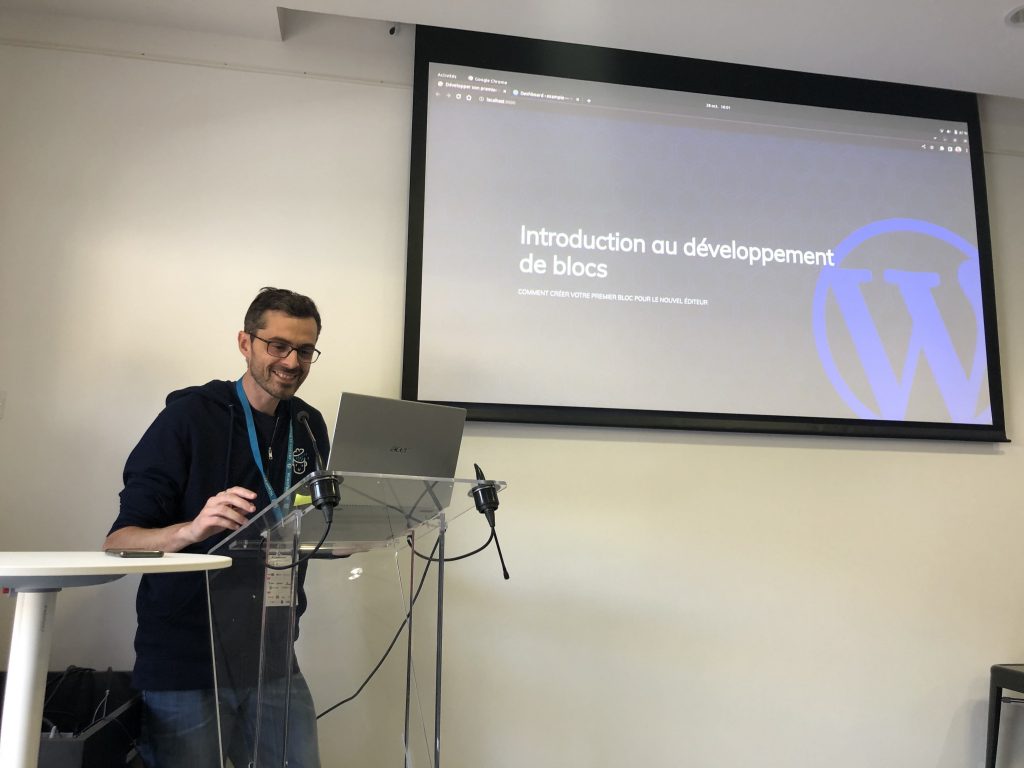
Vincent Dubroeucq explained the basics involved in creating a custom static block. He aimed to reassure developers that they were up to creating custom blocks and that they should try and not be afraid of it.
He then proceeded with a live, and step-by-step coding demo. He showed us the block generation, the block hierarchy, the edit method, then the save one, the attributes manipulation, and the use of several native blocks (RichText, MediaPlaceHolder, Button…)
It was nice to revise the custom block basics with Vincent. His mastery makes it look easy, and it’s always great to see crafters at work, especially live. I figured some things out on my own while developing blocks, but his explanations did clear my mind. Read his slides.
Gutenberg: au delà de l’éditeur de texte, by @benj_grolleau
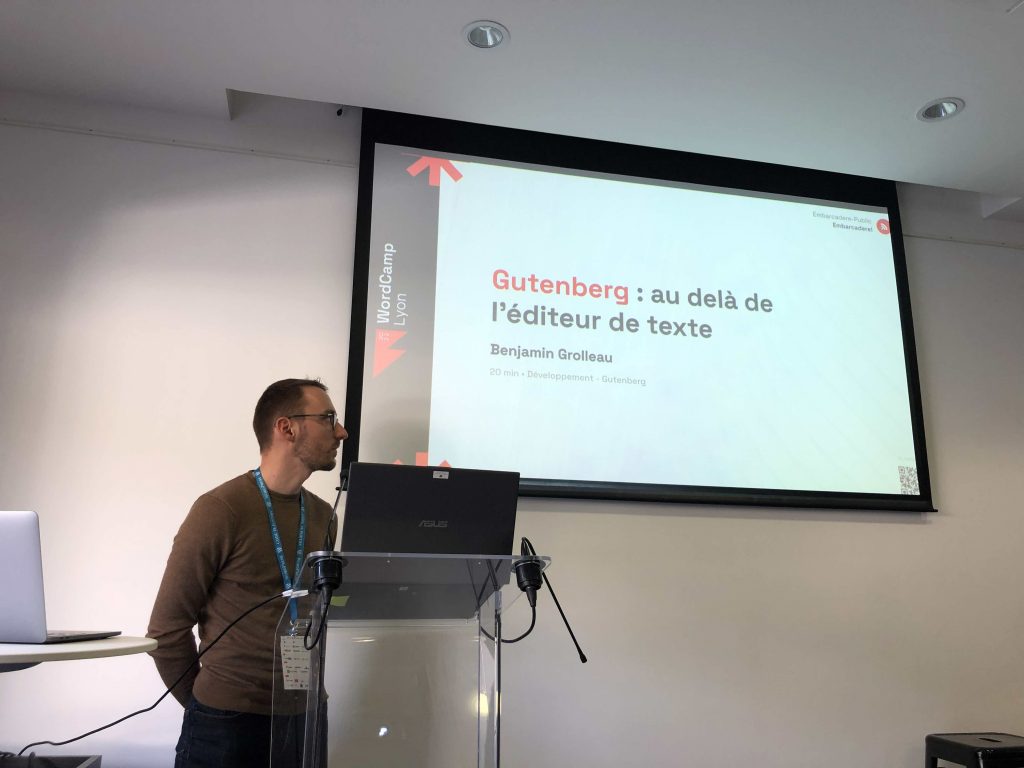
With his talk, Benjamin Grolleau then encouraged us to think outside the classic edition box.
He showed us more advanced blocks code:
- The use of a map block integrated with React Leaflet,
- The use of a three.js scene directly on Gutenberg with a custom block. This would allow building a product visualizer and customizer via the use of a blender model.
- Starting with a set of custom blocks, hooks, and context, Benjamin then showed us how we could create a bill generator.
Interesting talk by Benjamin, uncovering the creative potential of custom blocks. He reminded us that WordPress and Gutenberg are just tools that are at our service to build great things. It’s up to us to break their basic usages and explore new creative horizons. Read his slides.
Je n’aime pas écrire du CSS, depuis je thème mieux, by @TDeneulin
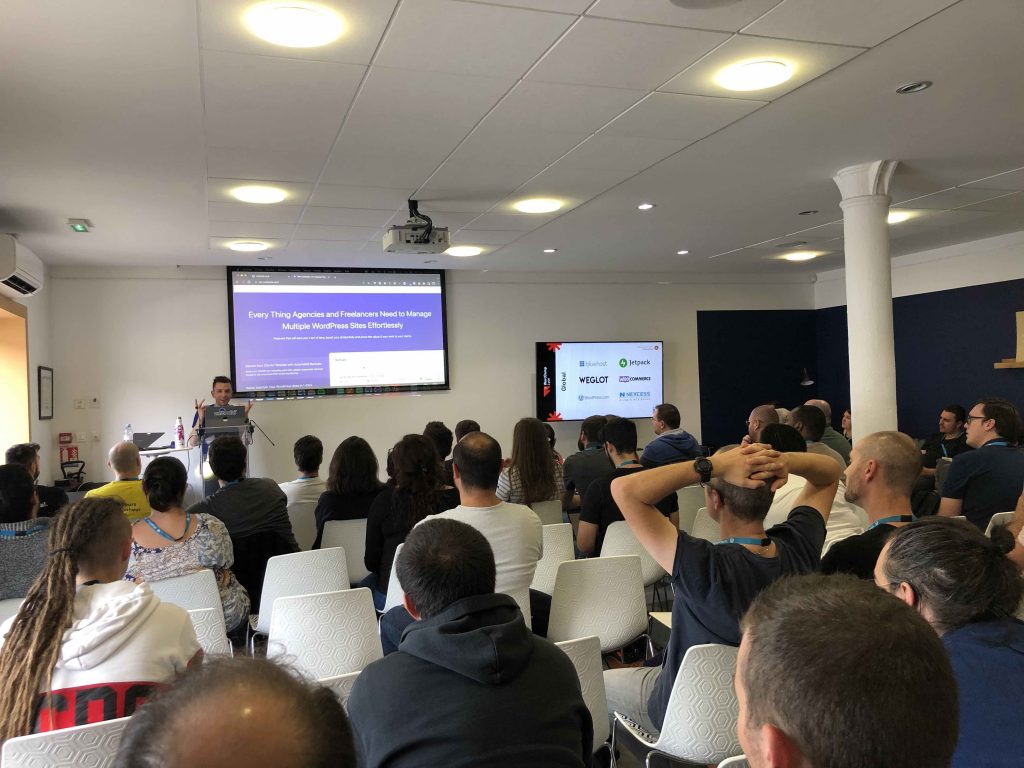
With his talk, Thomas Deneulin presented us the use of a different CSS paradigm: utility classes.
Instead of writing selectors and CSS properties in a separate stylesheet, the idea is to use pre-defined utility classes on the HTML elements we want to style. This new paradigm has been made popular by the tailwind framework for example, and it presents several advantages: design system API, no configuration needed, fewer dependencies to maintain in a development stack, shipping just the needed CSS, composition mindset, speed of execution, descriptive class names that help you represent what the element looks like…
I can see a certain learning curve. And it does tie the content with the styling, which can be a blocker in certain cases (vendors for example). But overall it was an interesting talk that opens the mind into considering what advantages other approaches have. Read his slides.
Optimiser la web performance d’un site WordPress, by @Eroan
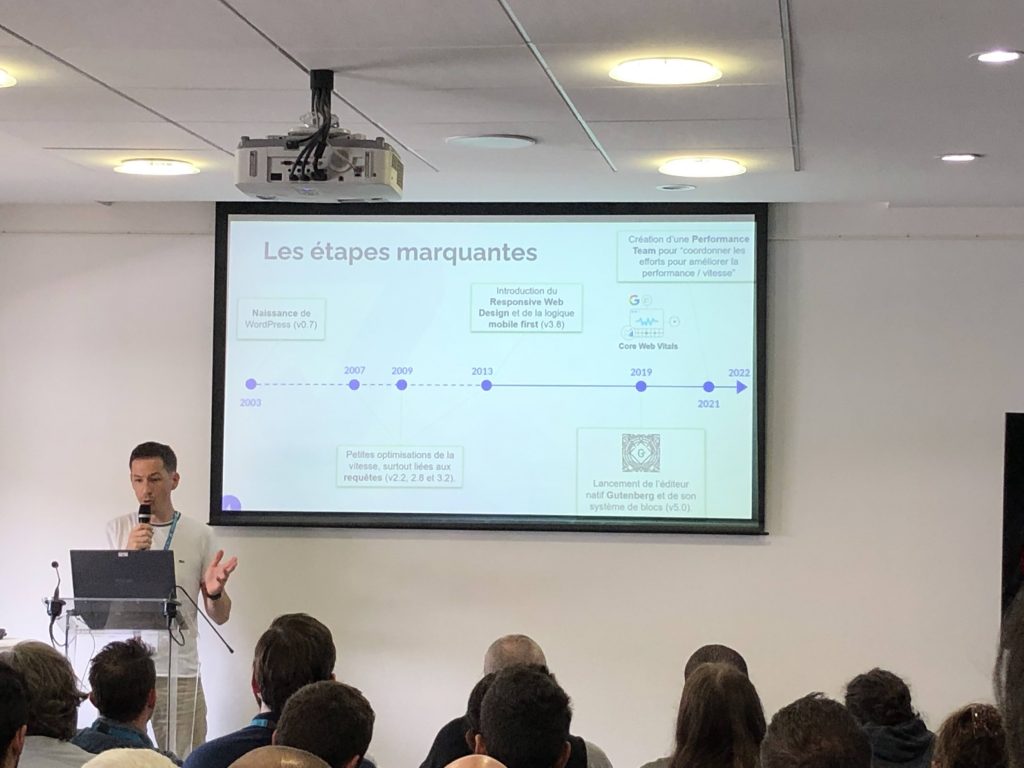
Eroan Boyer packed his presentation with many performance tips and pitfalls to avoid. The talk was well organized, and I’m sure it could be useful for many different people even with different background levels. With each slide, he taught us a particular scenario (theme, plugin, fonts…), mistakes to avoid, his recommendation to do better, tools of choice, and metrics affected. I’ll definitely go back to his slides in the future (they are not available online yet).
Etre designer dans l’écosystème WordPress, by @bter_design

I really enjoyed this talk by Joffrey Jochum. I liked his passion, dedication, exigency, and approach.
He told us how Gutenberg could be a great opportunity for designers to level up their design skills, but also their collective and even their technical ones. He encouraged us to be empathetic and to care about other team members’ tasks to fluidify the overall design and build process. Read his slides.
My talk: La courbe d’apprentissage d’un développeur, de WordPress classique à FSE.
I presented my talk at 11.30, just after Benjamin’s one. I was lucky not to be too stressed out, and to have a good audience, which gave me confidence.
I presented the different sections according to my plan: A recap of the Gutenberg Project, Block theme declaration, templates and parts, low code tools (patterns and reusable blocks), and custom blocks (static and dynamic).
The timing was right, about 35 minutes, which gave us some time for questions, and I got quite a few of them, which was nice. It was great to exchange with the audience at the end.
You can also access the slides online.
If you would like to watch the conference entirely, the video is available below :
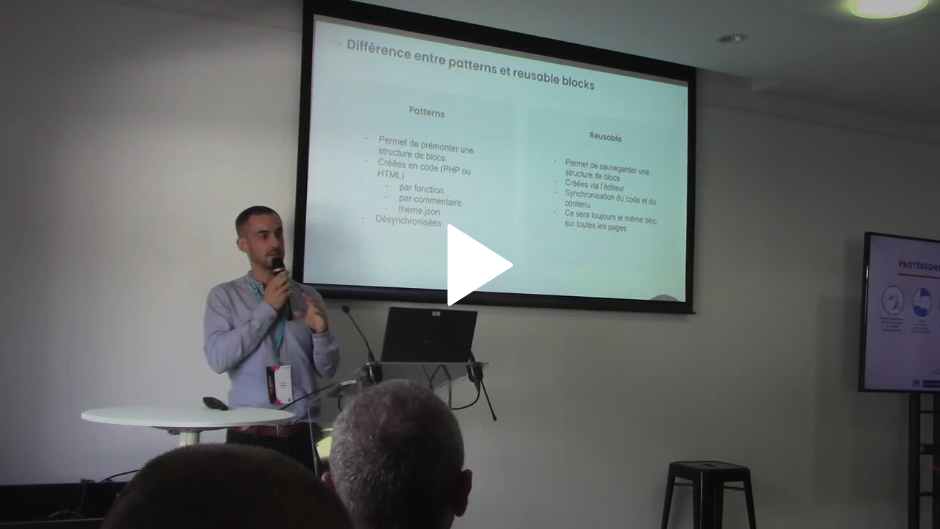
Overall it was a great experience. It required a lot of work but I’m happy about the result and the time I’ve had.
The after party
After such a great day, we carried on our conversations at the Hard Rock Café.
It was the occasion to debrief, exchange points of view, make new friends, and decompress.
I’ve had a great time with many different attendees, organizers, and volunteers.
I’d like to thank everyone who put time and effort to make sure we all had a lovely day because I definitely did.
I’ve heard there’s a WordCamp France in preparation, maybe we’ll see each other again there ?
If you found this article interesting, I encourage you to follow my work via the form below. I mainly write about production teams' optimization, processes, management, and the tooling around those subjects. I’m even preparing an online course to concentrate all of this for you in a unique place. I hope it can help you get the very best out of your development team.
Follow my work
Follow me to get notified of new posts, resources, and online courses I create.